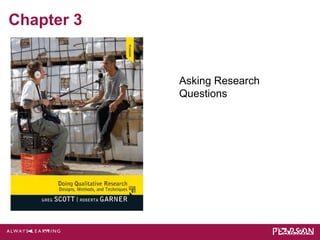More Related Content
Similar to Garner c3 (20)
More from Beulah Heights University
More from Beulah Heights University (20)
Garner c3
- 2. Introduction: What Is A Research
Question?
• Research questions guide research
projects
• Without a guiding research question:
– Empirical studies would be mere reports of
observations, at best entertaining to read but:
• More likely amounting to a disorganized set of field
notes or a hot mess of aimless numbers
© 2013 Pearson Education, Inc. All rights reserved.
- 3. What Does A Research Question
Produce?
• Research reports
• Way of knowing; Scientific method
• The Sociologist’s Way
• The Scientific Method:
– A Set of Rules Guiding Procedures,
Presentation of Evidence, and Storytelling
© 2013 Pearson Education, Inc. All rights reserved.
- 4. What Does A Research Question
Produce?
• Principles of the Scientific Method
– Objectivity
– Generalizability
– Falsifiability
– Reproducibility
© 2013 Pearson Education, Inc. All rights reserved.
- 5. Framing Research Questions
• Learning The Language: Qualitative
Research Vernacular
– Lost In Translation
• Underlying Agreement Between Qualitative &
Quantitative Researchers
– Formulating A Research Question And Its
Associated Hypotheses—dos And Don’ts
© 2013 Pearson Education, Inc. All rights reserved.
- 6. Framing Research Questions
• Rqs Must Be Specific And Falsifiable
• Rqs Focus On Behavioral Outcomes
– Defining Your Unit Of Analysis
– Avoiding Reductionism
– Variables
– Hypothesis
© 2013 Pearson Education, Inc. All rights reserved.
- 7. Doubts And Concerns: Are We
Being Too Scientific?
• Two cries of alarm from colleagues:
– We have described for formulating research
questions is too close to the scientific method;
• Some individuals engaged in social inquiry do not
use these rules and in fact explicitly reject them
– We have blurred the lines between
quantitative and qualitative research
© 2013 Pearson Education, Inc. All rights reserved.
- 8. Choosing Research Activities
• Defining the research question, specifying
hypotheses;
– And establishing the independent and
dependent variables
• Figure out how you will create the data
© 2013 Pearson Education, Inc. All rights reserved.
- 9. Where Do Research Questions
Come From?
• From you
• Grow out of theory
• Previous research and systematic
observation
• Review of literature
© 2013 Pearson Education, Inc. All rights reserved.
- 10. Tips For Formulating A Research
Question (Some examples)
• Select a topic that interests you
• Read what others have written about this
topic
• Be clear about your choice of units of
analysis
• Experiment with stating your ideas both as
questions and as hypotheses
© 2013 Pearson Education, Inc. All rights reserved.
